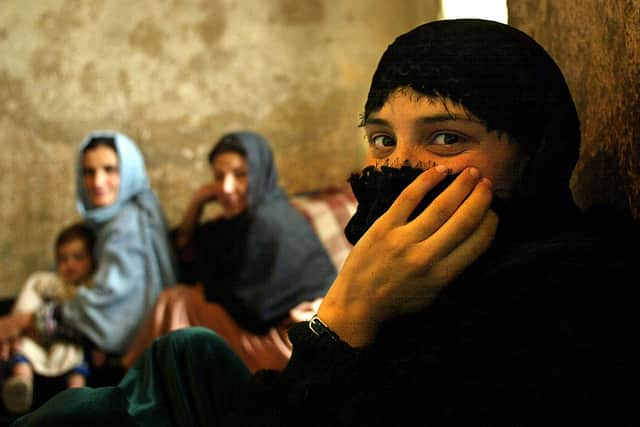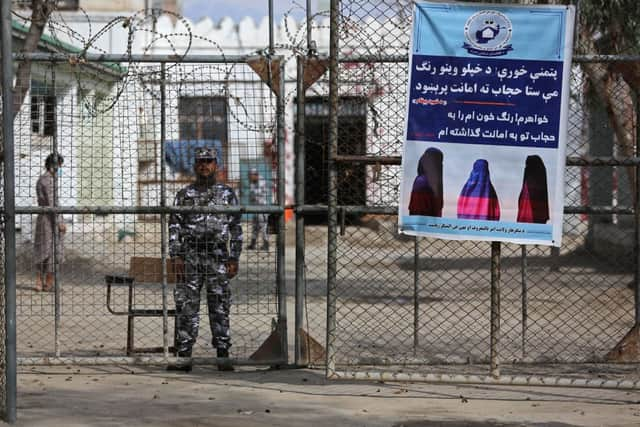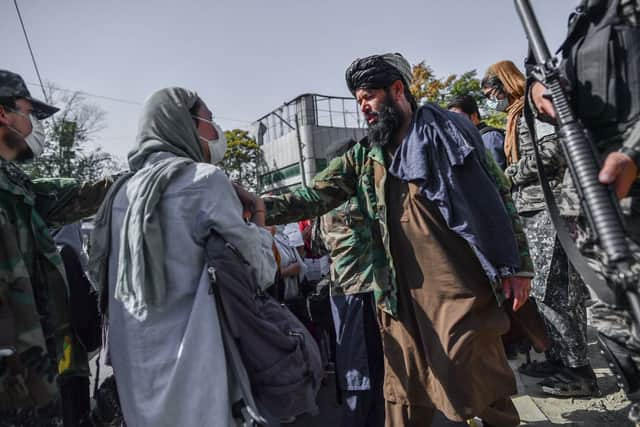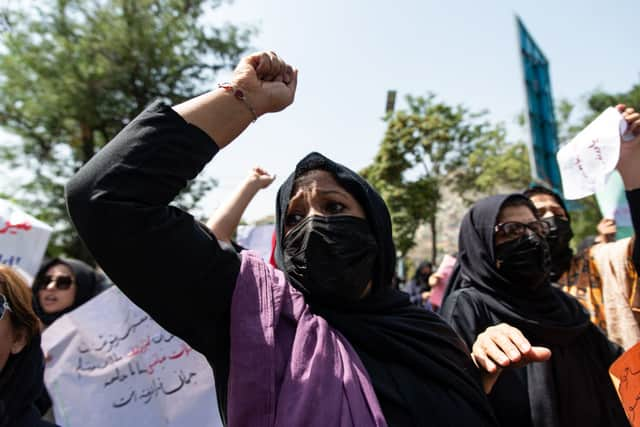Excluded, imprisoned, tortured: the Taliban’s treatment of women in Afghanistan - MPs call for action
and live on Freeview channel 276
When the Taliban took back control of Afghanistan in August 2021, it promised to protect women’s rights. It promised that women would not suffer under its regime.
This, understandably, was a pledge many viewed with suspicion - and now, nearly two years into its rule, it is clearer than ever that the Taliban never intended to keep its word.
Advertisement
Hide AdAdvertisement
Hide AdWomen in Afghanistan have experienced an extreme crackdown on their rights and freedom. Girls older than 11 have no access to an education; all women are banned from universities, parks, and gyms; and it’s mandatory to wear a head-to-toe burqa while out in public.
Under the Taliban’s harsh interpretation of Islamic Law, or Sharia, women are also blocked from most fields of employment and can’t leave home unless accompanied by a male escort. In the words of Alison Davidian, the United Nations’ special representative for women in Afghanistan, “the Taliban have continually and systematically erased women from public life.”
The consequences for ‘breaking’ these rules - or doing something the Taliban deems to be in breach of its regime - are severe. Afghan women have been imprisoned, tortured, and subjected to forced disappearance when they have been spotted near public areas they are excluded from.


‘Cruel, inhumane, degrading’
According to a report by Amnesty International, there’s been a “sharp increase” in the number of women arrested or detained for appearing outside without a male escort - or with a man who the Taliban decides does not qualify as a ‘mahram’. These women are then charged with ‘zina’, meaning trying to engage in sex outside marriage.
Advertisement
Hide AdAdvertisement
Hide AdWomen are also frequently being arrested for ‘moral’ crimes after taking part in peaceful protests - then detained without any access to legal aid. The Taliban subsequently denies any knowledge of these women’s whereabouts to their families and friends.
Once in prison, the conditions are said to be “cruel, inhumane and degrading”. Testimonies collected by Amnesty reveal that women are subjected to torture - such as being chained up, beaten, given electric shocks, and threatened with death.
They also have to endure overcrowded cells, inadequate quantity and quality of food, a lack of access to beds and toilets, and frequent lice and scabies infestations.


Women who were survivors of gender-based violence and were living in shelters before the Taliban’s takeover are now being held in these detention centres - and the majority have been separated from their children.
Advertisement
Hide AdAdvertisement
Hide AdIf a woman wants to escape jail, one of her only options is to be forcibly married to a member of the Taliban. Otherwise, they have to depend on any “influential” contacts they might have or how much of a bribe they can pay.
Those without money or “influence” are denied access to lawyers, and are often not brought before a court at all with no access to a fair trial.
Some are therefore subject to indefinite detention, while the United Nations Assistance Mission in Afghanistan (UNAMA) has verified a number of cases of women (and men) who have been accused of “moral” offences being sentenced to corporal punishment - including flogging, stoning to death, and mutilation.
‘Crimes against humanity’
Amnesty International has argued that the violations committed against women and girls at the hands of the Taliban amount to “crimes against humanity”.
Advertisement
Hide AdAdvertisement
Hide AdIt praised the resumption of the International Criminal Court’s investigation in Afghanistan, but called for a more “robust” international response - urging countries to provide refugee status for all women from Afghanistan.
Some of these calls were echoed by MPs during a debate in UK Parliament on support for Afghan women and girls on Tuesday (6 June). Liberal Democrat MP Wendy Chamberlain, who called the debate, said: “These crimes against humanity are so appalling that it is tempting to look away. But we must not and we cannot.”
She then urged the Home Office to create more “safe and legal routes” for women from Afghanistan.


Meanwhile, SNP MP Alison Thewliss detailed the “terrified” phone calls she has received from constituents over the past nearly two years who have relatives still stuck in Afghanistan. Many have been unable to get to the UK because of the Home Office’s “petty” immigration and refugee systems, she claimed.
Advertisement
Hide AdAdvertisement
Hide Ad“People are stuck because they are waiting for the Home Office to process their paperwork,” Thewliss said. “Others have come across barriers such as English Language tests or Tuberculosis tests.”
The MP argued that the UK’s Afghan Resettlement Scheme was not properly functioning - warning that many people who expressed interest have been given “no timescales”. She continued: “How many people are still pending in that scheme? How many people are waiting to be reunited with their family in the UK?”
She then asked if the Home Office could provide a timescale for when specific pathways will be created for women and girls from Afghanistan, remarking: “Something must be done, otherwise the blood of these women and children will be on our hands.”


Foreign Office Minister David Rutley, who responded to the debate, also voiced his own concerns for the welfare of Afghan women and girls - and promised to pass on the queries raised to his “counterparts” at the Home Office.
Advertisement
Hide AdAdvertisement
Hide AdHe said that the government was “intent” on supporting women and girls in Afghanistan, highlighting that 24,500 people had been brought to safety since April 2021, while 9,000 people evacuated from the country had been granted settled status in the UK.
At the start of 2022, the Home Office said it would resettle thousands more Afghans who had been referred by the United Nations High Commissioner for Refugees (UNHCR). Last year, there were 6,000 arrivals in the UK - including those who came to the country under relocation programmes for Afghanistan.
A separate scheme has also been set up to allow people to resettle in Britain who were “particularly vulnerable, such as women and girls at risk and members of minority groups.” There are only 1,500 places available, however, and expressions of interest have closed.
Comment Guidelines
National World encourages reader discussion on our stories. User feedback, insights and back-and-forth exchanges add a rich layer of context to reporting. Please review our Community Guidelines before commenting.
